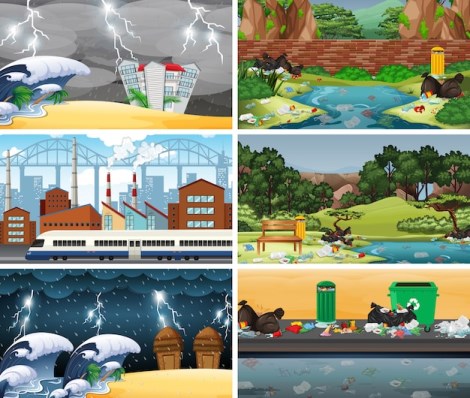Fascinating Facts About Floods for Kids

Did you know that floods are natural disasters that happen when there is too much water in an area?
Floods can be caused by heavy rain, melting snow, or even hurricanes.
It’s important to stay informed about flood warnings and evacuation orders from the authorities.
During a flood, it’s crucial to stay away from low-lying areas and move to higher ground.
Floodwaters can be dangerous and carry debris, so it’s essential to avoid walking or driving through them.
Did you know that floods can damage homes, buildings, and infrastructure?
Floods can also harm crops, which can affect the food supply in an area.
Flooding can cause power outages, making it important to have emergency supplies and a plan in place.
It’s crucial to listen to emergency officials and follow their instructions during a flood.
Floods can happen anywhere, so even if you don’t live near a river or the ocean, it’s essential to stay prepared.
Floods can be scary, but learning about them and how to stay safe can help calm your fears.
Did you know that some animals are better equipped to handle floods than humans?
Floods can create new habitats for certain species and contribute to biodiversity in an area.
Understanding how floods happen can help us develop better flood control measures in the future.
Flooding can disrupt transportation systems and make it difficult for people to move around.
Fascinating Facts About Floods for Kids part 2
Even after a flood, it’s important to be cautious as the water may have left behind hidden dangers.
Floods can impact communities for weeks or even months, so it’s crucial for everyone to support each other during these times.
Did you know that floods can cause soil erosion?
Flooding can also lead to water pollution when chemicals and contaminants are carried by the water.
It’s important to have an emergency plan in place, including a designated meeting point and contact information for family members.
Floods can cause significant financial losses for individuals and businesses.
Learning how to swim and practicing water safety can help protect you during a flood.
During a flood, it’s important to have a supply of clean drinking water, as tap water may become contaminated.
Understanding the signs and symptoms of flood-related diseases can help you seek medical attention if needed.
Floods can be devastating, but communities can come together to rebuild and recover.
Flooding can have long-term effects on a region’s economy, affecting jobs and businesses.
Did you know that floods have shaped the Earth’s landscapes over millions of years?
It’s important to keep an emergency kit stocked with essentials like food, water, and first aid supplies in case of a flood.
Flooding can cause psychological distress, so it’s important to seek support if you’re feeling overwhelmed.
During a flood, it’s crucial to stay away from downed power lines, as they can still be energized and pose a risk.
Flooding can cause severe damage to roads and bridges, leading to lengthy repair times.
Did you know that floods can contribute to the spread of diseases like malaria and dengue fever?
Learning how to properly sandbag can help protect your home from floodwaters.
It’s important to have a family communication plan in place in case you get separated during a flood.
Flooding can cause disruptions in access to healthcare services, so it’s important to have medications and first aid supplies readily available.
Did you know that floods can sometimes uncover archeological treasures hidden for centuries?
Flooding can cause emotional stress, so it’s important to practice self-care and reach out for help if needed.
During a flood, it’s essential to turn off utilities like electricity and gas to prevent accidents and damage.
Floods can lead to temporary or even permanent displacement of people from their homes.
Learning how to read flood maps can help you understand the risks in your area and take appropriate precautions.
Did you know that floods can cause landslides in hilly or mountainous regions?
Flooding can damage important infrastructure, like schools and hospitals, affecting a community’s ability to recover.
It’s important to have a plan for your pets during a flood, including provisions for their safety and care.
Flooding can cause shortages of essential supplies like food and clean water, highlighting the importance of disaster preparedness.
Did you know that floods can have cultural and historical significance, shaping the stories and traditions of communities over time?

